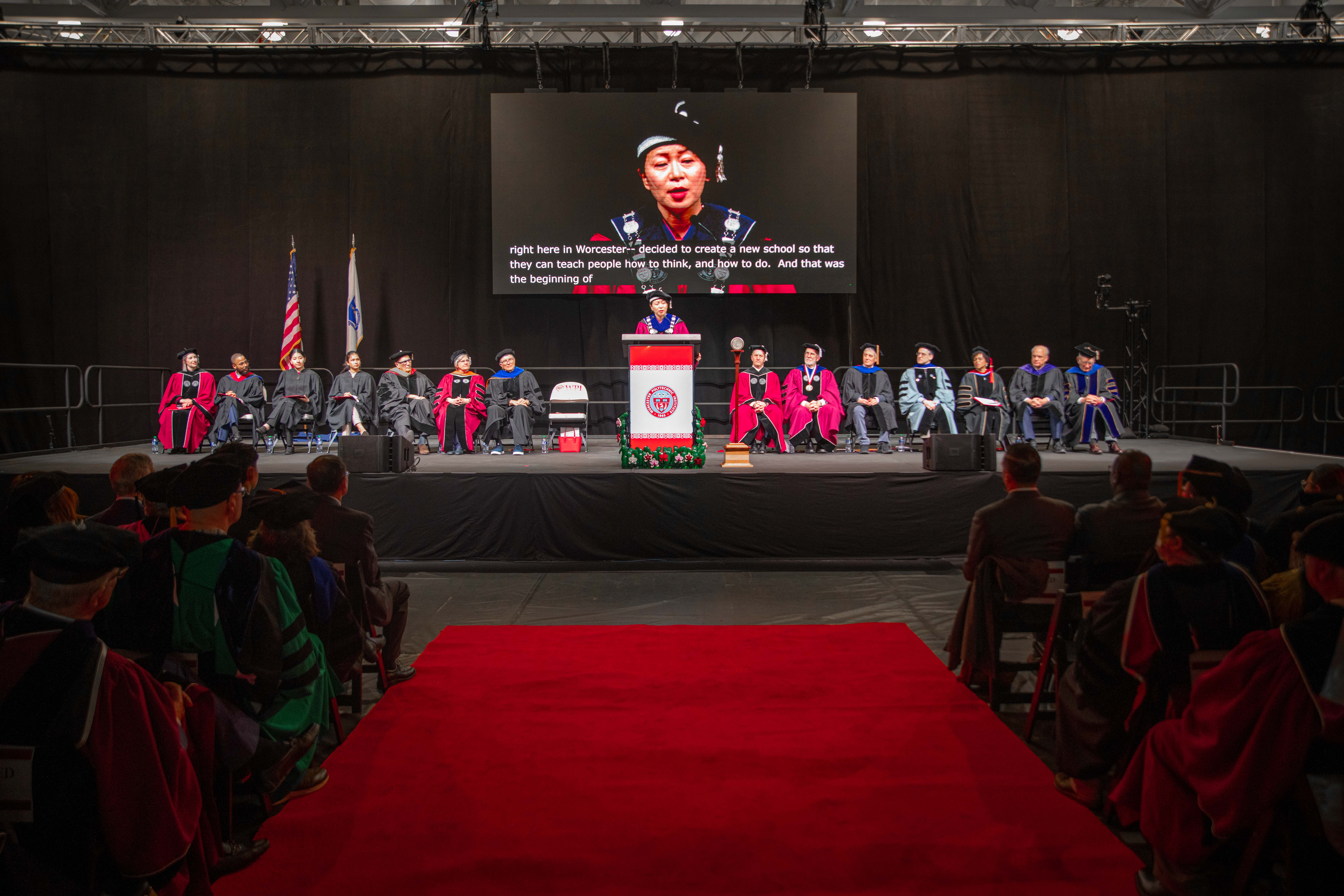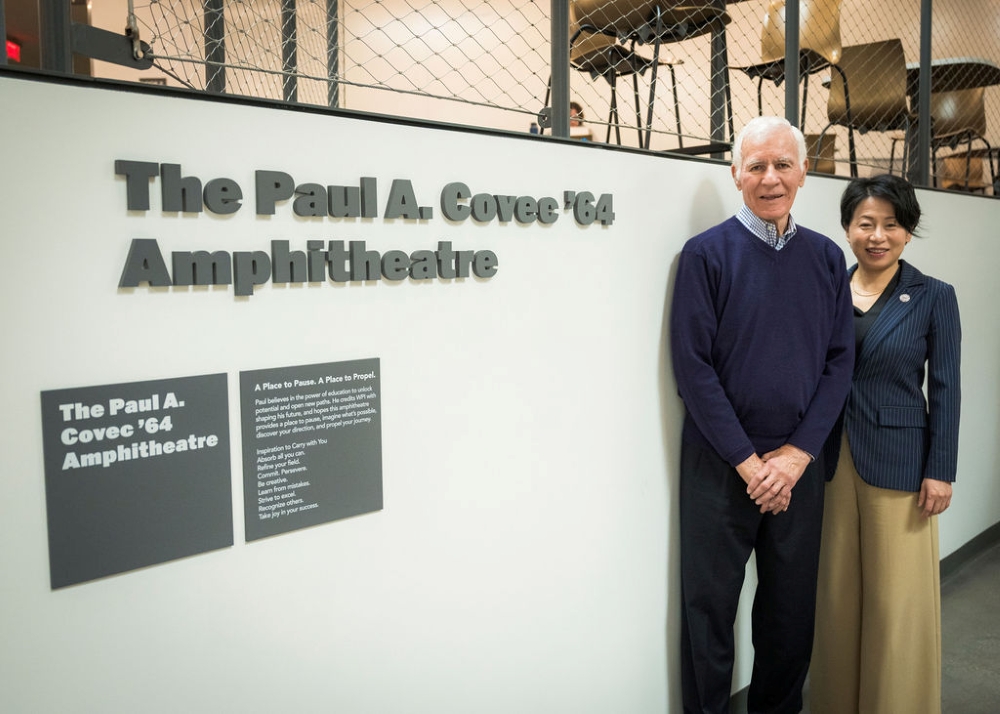Two Worcester Polytechnic Institute (WPI) alumni have made generous gifts to the university that will provide needed financial support for highly accomplished students who might not otherwise be able to afford to attend the university. Robert A. Foisie ’56 recently gave $9.4 million to support the Robert Foisie Scholars Fund for undergraduate students, which he established in 2009. George Messenger Jr. ’51 and his wife, Priscilla, announced that WPI will receive more than $6 million from their estate, the funds also used to support undergraduate scholarships, through the George and Priscilla Messenger Scholarship Fund.
"Through these substantial gifts—two of the largest in WPI history—Mr. Foisie and the Messengers have greatly expanded WPI’s capacity to offer comprehensive scholarship support to bright, talented, and ambitious students who are best suited to succeed in this university’s culture of high achievement," says President Dennis Berkey. "These gifts have inspired other members of our alumni community to support WPI scholarships, and their cumulative efforts will help the university to support even more students. We thank Bob Foisie, and George and Priscilla Messenger, for their dedication to WPI."
Foisie and the Messengers are among hundreds who have chosen to help deserving young men and women attend WPI by providing financial support. During the 2010–11 academic year, WPI made more than 950 scholarship awards through the generosity of alumni and friends.
"I regularly hear from students that they would not be able to attend WPI if it were not for this generous scholarship support,” says Kristin Tichenor, senior vice president for enrollment and institutional strategy. "Endowed scholarships play a vital role in keeping WPI’s doors open to high achieving students from all socio-economic backgrounds. Mr. Foisie and Dr. and Mrs. Messenger are ensuring that more of our students have the opportunity to make the most of their WPI education."
Robert Foisie received a mechanical engineering degree from WPI and a master’s degree from Cornell University. Early in his career he found a way to simplify the design of a fuel-control valve for jet aircraft. This improved valve was more efficient and less expensive to make. The work, which led to a patent, typifies his approach to business and life: keep it simple. Among his many credits, Foisie is founder and former president of Matik North America Inc. in West Hartford, Conn., an import, distribution, and service firm specializing in paper-processing machinery. Foisie also owned a Swiss company that makes cartoning and packaging machinery. He began his career as an engineer at Hamilton Standard Co. and later served as chief production engineer at Pratt & Whitney in Hartford, Conn. His current entrepreneurial and business interests span from telecommunications to real estate.
A trustee emeritus of the university, Foisie has a long and generous history of philanthropy at WPI, with a particular focus on undergraduate scholarships. Since 2009, the Robert Foisie Scholars Fund has provided scholarships for up to 10 incoming undergraduate students, chosen from the top of the class, each year. Each Foisie Scholar receives a four-year, full-tuition scholarship and a one-time allowance to be used for a WPI Global Studies experience. WPI currently has 23 Foisie Scholars: 10 entering their junior year, five entering their sophomore year, and eight incoming first year students. Prior to establishing the Foisie Scholars Fund, he had established 17 other undergraduate scholarships, named in honor of WPI professors who influenced his life. He also supported the construction of the university’s campus center in 2001.
According to Foisie, who received scholarships as a WPI student, "There were several faculty members who made a lasting impression upon me during my student days through their professional competence and their concern for students. Those fond memories have fueled my dream of establishing a scholarship fund to support qualified students with financial need and a burning ambition to make a difference in the world."
Scholarship support has also been a philanthropic priority for George and Priscilla Messenger over the years. A child of the Great Depression, George Messenger has experienced firsthand the financial burden of a college education; Priscilla comes from a long line of educators and understands the critical role of education in individual success and achievement. With these values in mind, they established the George and Priscilla Messenger Endowed Scholarship Fund in 2001; their latest gift, made through a bequest, will be added to this fund.
"I firmly believe that students should not be burdened with a heavy debt load when they graduate from college," says George Messenger. "WPI provided me with a scholarship that—combined with outside jobs—enabled me to complete my studies. I was 16 when I entered WPI and graduated with a degree in physics. WPI provided me with the solid education that made my successful career possible."
Messenger is owner and vice president of Las Vegas, Nev.-based Messenger and Associates, a diversified company that provides engineering consulting, holds real estate, and offers financial management and investment services. A recognized authority on transient radiation effects on electronics, Messenger holds numerous patents in the microwave diode and hardened semiconductor fields. His discoveries include the Messenger-Spratt Equation, which describes the effects of neutron radiation on bipolar devices, and the Kirk Effect—also called current-induced base push-out—an apparent increase in the width of the base of bipolar transistors that occurs at very high injection levels and current densities. His discoveries showed how electronics could be hardened against the effects of radiation. Messenger also contributed to the development of the EKG and the hardening of circuits for the atomic clock in the Global Positioning Satellite. He also conducted research at the Naval Research Laboratory on a proton radiator for fighting cancer that localized radiation damage to the area of the body being treated.
Messenger received his bachelor’s degree in physics from WPI. He received a master’s degree in electrical engineering from the University of Pennsylvania, and a PhD in engineering from California Coast University. In recognition of his pioneering work on the hardening of electronic systems, Messenger received an honorary Doctor of Engineering degree from WPI in 2009.



